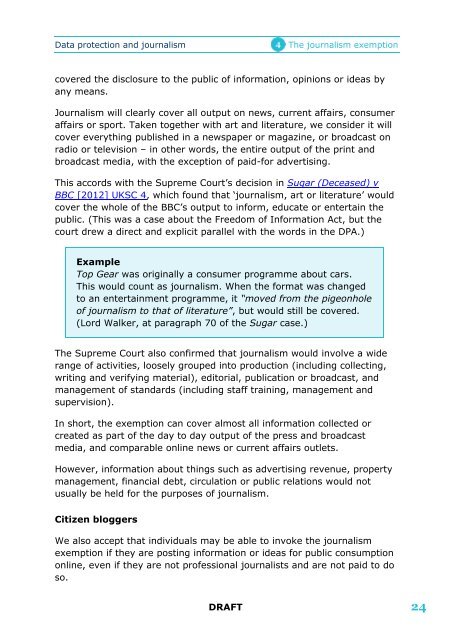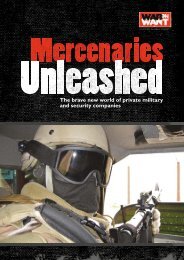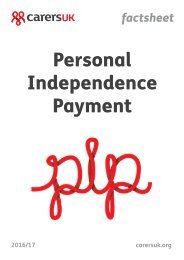data-protection-and-journalism-a-guide-for-the-media-draft
data-protection-and-journalism-a-guide-for-the-media-draft
data-protection-and-journalism-a-guide-for-the-media-draft
Create successful ePaper yourself
Turn your PDF publications into a flip-book with our unique Google optimized e-Paper software.
Data <strong>protection</strong> <strong>and</strong> <strong>journalism</strong><br />
The <strong>journalism</strong> exemption<br />
covered <strong>the</strong> disclosure to <strong>the</strong> public of in<strong>for</strong>mation, opinions or ideas by<br />
any means.<br />
Journalism will clearly cover all output on news, current affairs, consumer<br />
affairs or sport. Taken toge<strong>the</strong>r with art <strong>and</strong> literature, we consider it will<br />
cover everything published in a newspaper or magazine, or broadcast on<br />
radio or television – in o<strong>the</strong>r words, <strong>the</strong> entire output of <strong>the</strong> print <strong>and</strong><br />
broadcast <strong>media</strong>, with <strong>the</strong> exception of paid-<strong>for</strong> advertising.<br />
This accords with <strong>the</strong> Supreme Court’s decision in Sugar (Deceased) v<br />
BBC [2012] UKSC 4, which found that ‘<strong>journalism</strong>, art or literature’ would<br />
cover <strong>the</strong> whole of <strong>the</strong> BBC’s output to in<strong>for</strong>m, educate or entertain <strong>the</strong><br />
public. (This was a case about <strong>the</strong> Freedom of In<strong>for</strong>mation Act, but <strong>the</strong><br />
court drew a direct <strong>and</strong> explicit parallel with <strong>the</strong> words in <strong>the</strong> DPA.)<br />
Example<br />
Top Gear was originally a consumer programme about cars.<br />
This would count as <strong>journalism</strong>. When <strong>the</strong> <strong>for</strong>mat was changed<br />
to an entertainment programme, it “moved from <strong>the</strong> pigeonhole<br />
of <strong>journalism</strong> to that of literature”, but would still be covered.<br />
(Lord Walker, at paragraph 70 of <strong>the</strong> Sugar case.)<br />
The Supreme Court also confirmed that <strong>journalism</strong> would involve a wide<br />
range of activities, loosely grouped into production (including collecting,<br />
writing <strong>and</strong> verifying material), editorial, publication or broadcast, <strong>and</strong><br />
management of st<strong>and</strong>ards (including staff training, management <strong>and</strong><br />
supervision).<br />
In short, <strong>the</strong> exemption can cover almost all in<strong>for</strong>mation collected or<br />
created as part of <strong>the</strong> day to day output of <strong>the</strong> press <strong>and</strong> broadcast<br />
<strong>media</strong>, <strong>and</strong> comparable online news or current affairs outlets.<br />
However, in<strong>for</strong>mation about things such as advertising revenue, property<br />
management, financial debt, circulation or public relations would not<br />
usually be held <strong>for</strong> <strong>the</strong> purposes of <strong>journalism</strong>.<br />
Citizen bloggers<br />
We also accept that individuals may be able to invoke <strong>the</strong> <strong>journalism</strong><br />
exemption if <strong>the</strong>y are posting in<strong>for</strong>mation or ideas <strong>for</strong> public consumption<br />
online, even if <strong>the</strong>y are not professional journalists <strong>and</strong> are not paid to do<br />
so.<br />
DRAFT 24




